formerly eScholarship Editions


|
|
|
|
Your request for similar items found 20 book(s). | Modify Search | Displaying 1 - 20 of 20 book(s) | |
| 1. |  | Title: The bridge betrayed: religion and genocide in Bosnia Author: Sells, Michael Anthony Published: University of California Press, 1996 Subjects: Religion | Politics | European History | Islam | History | Middle Eastern Studies | Jewish Studies | Christianity Publisher's Description: The recent atrocities in Bosnia-Herzegovina have stunned people throughout the world. With Holocaust memories still painfully vivid, a question haunts us: how is this savagery possible? Michael A. Sells answers by demonstrating that the Bosnian conflict is not simply a civil war or a feud of age-old adversaries. It is, he says, a systematic campaign of genocide and a Christian holy war spurred by religious mythologies.This passionate yet reasoned book examines how religious stereotyping - in popular and official discourse - has fueled Serbian and Croatian ethnic hatreds. Sells, who is himself Serbian American, traces the cultural logic of genocide to the manipulation by Serb nationalists of the symbolism of Christ's death, in which Muslims are "Christ-killers" and Judases who must be mercilessly destroyed. He shows how "Christoslavic" religious nationalism became a central part of Croat and Serbian politics, pointing out that intellectuals and clergy were key instruments in assimilating extreme religious and political ideas.Sells also elucidates the ways that Western policy makers have rewarded the perpetrators of the genocide and punished the victims. He concludes with a discussion of how the multireligious nature of Bosnian society has been a bridge between Christendom and Islam, symbolized by the now-destroyed bridge at Mostar. Drawing on historical documents, unpublished United Nations reports, articles from Serbian and Bosnian media, personal contacts in the region, and Internet postings, Sells reveals the central role played by religious mythology in the Bosnian tragedy. In addition, he makes clear how much is at stake for the entire world in the struggle to preserve Bosnia's existence as a multireligious society. [brief] Similar Items |
| 2. | 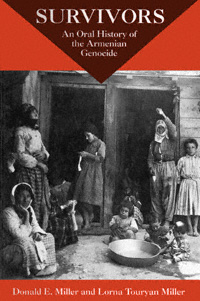 | Title: Survivors: an oral history of the Armenian genocide Author: Miller, Donald E. (Donald Earl) 1946- Published: University of California Press, 1993 Subjects: History | Middle Eastern History | Middle Eastern Studies | Religion Publisher's Description: Between 1915 and 1923, over one million Armenians died, victims of a genocidal campaign that is still denied by the Turkish government. Thousands of other Armenians suffered torture, brutality, deportation. Yet their story has received scant attention. Through interviews with a hundred elderly Armenians, Donald and Lorna Miller give the "forgotten genocide" the hearing it deserves. Survivors raise important issues about genocide and about how people cope with traumatic experience. Much here is wrenchingly painful, yet it also speaks to the strength of the human spirit. [brief] Similar Items |
| 3. |  | Title: Writing at the margin: discourse between anthropology and medicine Author: Kleinman, Arthur Published: University of California Press, 1997 Subjects: Anthropology | Medical Anthropology | Sociology | Medicine | Asian Studies | Social Problems Publisher's Description: One of the most influential and creative scholars in medical anthropology takes stock of his recent intellectual odysseys in this collection of essays. Arthur Kleinman, an anthropologist and psychiatrist who has studied in Taiwan, China, and North America since 1968, draws upon his bicultural, multidisciplinary background to propose alternative strategies for thinking about how, in the postmodern world, the social and medical relate. Writing at the Margin explores the border between medical and social problems, the boundary between health and social change. Kleinman studies the body as the mediator between individual and collective experience, finding that many health problems - for example the trauma of violence or depression in the course of chronic pain - are less individual medical problems than interpersonal experiences of social suffering. He argues for an ethnographic approach to moral practice in medicine, one that embraces the infrapolitical context of illness, the responses to it, the social institutions relating to it, and the way it is configured in medical ethics.Previously published in various journals, these essays have been revised, updated, and brought together with an introduction, an essay on violence and the politics of post-traumatic stress disorder, and a new chapter that examines the contemporary ethnographic literature of medical anthropology. [brief] Similar Items |
| 4. |  | Title: An anthropology of the subject: holographic worldview in New Guinea and its meaning and significance for the world of anthropology Author: Wagner, Roy Published: University of California Press, 2001 Subjects: Anthropology | Pacific Rim Studies | Geography | Cultural Anthropology | Folklore and Mythology Publisher's Description: An Anthropology of the Subject rounds out the theoretical-philosophical cosmos of one of the twentieth century's most intellectually adventurous anthropologists. Roy Wagner, having turned "culture" and "symbols" inside out (in The Invention of Culture and Symbols That Stand for Themselves, respectively), now does the same for the "subject" and subjectivity. In studying the human subject and the way human culture mirrors itself, Wagner has redefined holography as "the exact equivalence, or comprehensive identity, of part and whole in any human contingency." [brief] Similar Items |
| 5. | 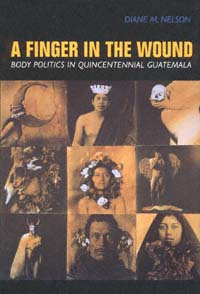 | Title: A finger in the wound: body politics in quincentennial Guatemala Author: Nelson, Diane M 1963- Published: University of California Press, 1999 Subjects: Anthropology | Latin American Studies | Latin American History Publisher's Description: Many Guatemalans speak of Mayan indigenous organizing as "a finger in the wound." Diane Nelson explores the implications of this painfully graphic metaphor in her far-reaching study of the civil war and its aftermath. Why use a body metaphor? What body is wounded, and how does it react to apparent further torture? If this is the condition of the body politic, how do human bodies relate to it - those literally wounded in thirty-five years of war and those locked in the equivocal embrace of sexual conquest, domestic labor, mestizaje , and social change movements?Supported by three and a half years of fieldwork since 1985, Nelson addresses these questions - along with the jokes, ambivalences, and structures of desire that surround them - in both concrete and theoretical terms. She explores the relations among Mayan cultural rights activists, ladino (nonindigenous) Guatemalans, the state as a site of struggle, and transnational forces including Nobel Peace Prizes, UN Conventions, neo-liberal economics, global TV, and gringo anthropologists. Along with indigenous claims and their effect on current attempts at reconstituting civilian authority after decades of military rule, Nelson investigates the notion of Quincentennial Guatemala, which has given focus to the overarching question of Mayan - and Guatemalan - identity. Her work draws from political economy, cultural studies, and psychoanalysis, and has special relevance to ongoing discussions of power, hegemony, and the production of subject positions, as well as gender issues and histories of violence as they relate to postcolonial nation-state formation. [brief] Similar Items |
| 6. |  | Title: Pathways of power: building an anthropology of the modern world Author: Wolf, Eric R 1923- Published: University of California Press, 2001 Subjects: Anthropology | Cultural Anthropology | Sociology Publisher's Description: This collection of twenty-eight essays by renowned anthropologist Eric R. Wolf is a legacy of some of his most original work, with an insightful foreword by Aram Yengoyan. Of the essays, six have never been published and two have not appeared in English until now. Shortly before his death, Wolf prepared introductions to each section and individual pieces, as well as an intellectual autobiography that introduces the collection as a whole. Sydel Silverman, who completed the editing of the book, says in her preface, "He wanted this selection of his writings over the past half-century to serve as part of the history of how anthropology brought the study of complex societies and world systems into its purview." [brief] Similar Items |
| 7. | 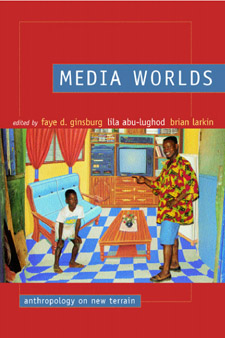 | Title: Media worlds: anthropology on new terrain Author: Ginsburg, Faye D Published: University of California Press, 2002 Subjects: Anthropology | Media Studies | Cultural Anthropology | Electronic Media | Postcolonial Studies | Ethnic Studies | Gender Studies | Sociology | Sociology | Sociology Publisher's Description: This groundbreaking volume showcases the exciting work emerging from the ethnography of media, a burgeoning new area in anthropology that expands both social theory and ethnographic fieldwork to examine the way media - film, television, video - are used in societies around the globe, often in places that have been off the map of conventional media studies. The contributors, key figures in this new field, cover topics ranging from indigenous media projects around the world to the unexpected effects of state control of media to the local impact of film and television as they travel transnationally. Their essays, mostly new work produced for this volume, bring provocative new theoretical perspectives grounded in cross-cultural ethnographic realities to the study of media. [brief] Similar Items |
| 8. | 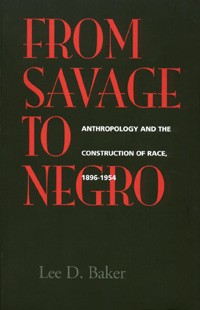 | Title: From savage to Negro: anthropology and the construction of race, 1896-1954 Author: Baker, Lee D 1966- Published: University of California Press, 1998 Subjects: Anthropology | Cultural Anthropology | Ethnic Studies | African American Studies | United States History | Sociology Publisher's Description: Lee D. Baker explores what racial categories mean to the American public and how these meanings are reinforced by anthropology, popular culture, and the law. Focusing on the period between two landmark Supreme Court decisions - Plessy v. Ferguson (the so-called "separate but equal" doctrine established in 1896) and Brown v. Board of Education (the public school desegregation decision of 1954) - Baker shows how racial categories change over time.Baker paints a vivid picture of the relationships between specific African American and white scholars, who orchestrated a paradigm shift within the social sciences from ideas based on Social Darwinism to those based on cultural relativism. He demonstrates that the greatest impact on the way the law codifies racial differences has been made by organizations such as the NAACP, which skillfully appropriated the new social science to exploit the politics of the Cold War. [brief] Similar Items |
| 9. | 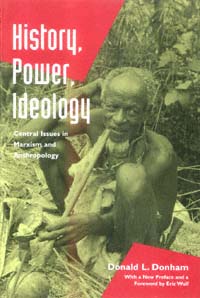 | Title: History, power, ideology: central issues in Marxism and anthropology Author: Donham, Donald L. (Donald Lewis) Published: University of California Press, 1999 Subjects: Anthropology | Social Theory | African Studies Publisher's Description: Is Marxism a reflection of the conceptual system it fights against, rather than a truly comprehensive approach to human history? Drawing on recent work in anthropology, history, and philosophy, Donald Donham confronts this problem in analyzing a radically different social order: the former Maale kingdom of southern Ethiopia."Every once in a while there appears a book that . . . opens up new ways of inquiring into the ways of the world. Donald Donham has written such a book. The style is quiet and judicious, but the effect is stunning. . . . In putting inherited partisan approaches to the test of explaining the realities of Maale society and culture, Donham enriches anthropology and imparts new vigor to the analytical Marxian traditions. History, Power, Ideology embodies a major accomplishment." - From the Foreword [brief] Similar Items |
| 10. | 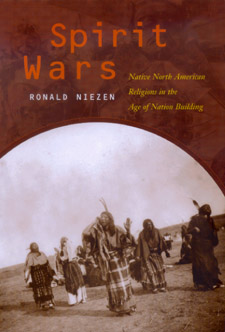 | Title: Spirit wars: Native North American religions in the age of nation building Author: Niezen, Ronald Published: University of California Press, 2000 Subjects: Religion | Cultural Anthropology | Native American Studies | Religion | American Studies | Anthropology Publisher's Description: Spirit Wars is an exploration of the ways in which the destruction of spiritual practices and beliefs of native peoples in North America has led to conditions of collective suffering--a process sometimes referred to as cultural genocide. Ronald Niezen approaches this topic through wide-ranging case studies involving different colonial powers and state governments: the seventeenth-century Spanish occupation of the Southwest, the colonization of the Northeast by the French and British, nineteenth-century westward expansion and nationalism in the swelling United States and Canada, and twentieth-century struggles for native people's spiritual integrity and freedom. Each chapter deals with a specific dimension of the relationship between native peoples and non-native institutions, and together these topics yield a new understanding of the forces directed against the underpinnings of native cultures. [brief] Similar Items |
| 11. | 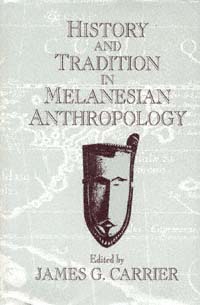 | Title: History and tradition in Melanesian anthropology Author: Carrier, James G Published: University of California Press, 1992 Subjects: Anthropology | East Asia Other Publisher's Description: Melanesian societies, like village societies in many parts of the world, are frequently portrayed as existing in a timeless, traditional present. These seven original essays offer an alternative view, one showing that historical evidence can and must inform our understanding of contemporary cultures.This collection brings together anthropologists and historians who maintain that the "timeless-traditionalism" approach of anthropology is inadequate. Life in the existing societies of Melanesia cannot be understood, they say, without examining how these societies are shaped by Western influences. The historical perspective that acknowledges ongoing political, economic, and social change results in less stereotypical descriptions of these traditional cultures. Historians and anthropologists of Melanesia and the Pacific will find here original and enlightening work that is sure to influence the theoretical orientation of Melanesian anthropology. [brief] Similar Items |
| 12. | 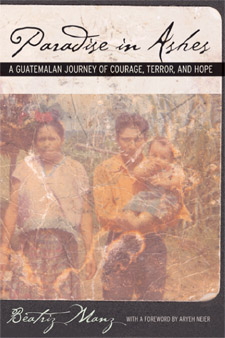 | Title: Paradise in ashes: a Guatemalan journey of courage, terror, and hope Author: Manz, Beatriz 1944- Published: University of California Press, 2004 Subjects: Anthropology | Latin American Studies | Politics | Ethnic Studies | Sociology | American Studies | Latin American History Publisher's Description: Paradise in Ashes is a deeply engaged and moving account of the violence and repression that defined the murderous Guatemalan civil war of the 1980s. In this compelling book, Beatriz Manz - an anthropologist who spent over two decades studying the Mayan highlands and remote rain forests of Guatemala - tells the story of the village of Santa María Tzejá, near the border with Mexico. Manz writes eloquently about Guatemala's tortured history and shows how the story of this village - its birth, destruction, and rebirth - embodies the forces and conflicts that define the country today. Drawing on interviews with peasants, community leaders, guerrillas, and paramilitary forces, Manz creates a richly detailed political portrait of Santa María Tzejá, where highland Maya peasants seeking land settled in the 1970s. Manz describes these villagers' plight as their isolated, lush, but deceptive paradise became one of the centers of the war convulsing the entire country. After their village was viciously sacked in 1982, desperate survivors fled into the surrounding rain forest and eventually to Mexico, and some even further, to the United States, while others stayed behind and fell into the military's hands. With great insight and compassion, Manz follows their flight and eventual return to Santa María Tzejá, where they sought to rebuild their village and their lives. [brief] Similar Items |
| 13. |  | Title: Genetic nature/culture: anthropology and science beyond the two-culture divide Author: Goodman, Alan H Published: University of California Press, 2003 Subjects: Anthropology | Biology | Sociology Publisher's Description: The so-called science wars pit science against culture, and nowhere is the struggle more contentious - or more fraught with paradox - than in the burgeoning realm of genetics. A constructive response, and a welcome intervention, this volume brings together biological and cultural anthropologists to conduct an interdisciplinary dialogue that provokes and instructs even as it bridges the science/culture divide. Individual essays address issues raised by the science, politics, and history of race, evolution, and identity; genetically modified organisms and genetic diseases; gene work and ethics; and the boundary between humans and animals. The result is an entree to the complicated nexus of questions prompted by the power and importance of genetics and genetic thinking, and the dynamic connections linking culture, biology, nature, and technoscience. The volume offers critical perspectives on science and culture, with contributions that span disciplinary divisions and arguments grounded in both biological perspectives and cultural analysis. An invaluable resource and a provocative introduction to new research and thinking on the uses and study of genetics, Genetic Nature/Culture is a model of fruitful dialogue, presenting the quandaries faced by scholars on both sides of the two-cultures debate. [brief] Similar Items |
| 14. |  | Title: The life of the law: anthropological projects Author: Nader, Laura Published: University of California Press, 2002 Subjects: Anthropology | Law Publisher's Description: Laura Nader, an instrumental figure in the development of the field of legal anthropology, investigates an issue of vital importance for our time: the role of the law in the struggle for social and economic justice. In this book she gives an overview of the history of legal anthropology and at the same time urges anthropologists, lawyers, and activists to recognize the centrality of law in social change. Nader traces the evolution of the plaintiff's role in the United States in the second half of the twentieth century and passionately argues that the atrophy of the plaintiff's power during this period represents a profound challenge to justice and democracy. Taking into account the vast changes wrought in both anthropology and the law by globalization, Nader speaks to the increasing dominance of large business corporations and the prominence of neoliberal ideology and practice today. In her discussion of these trends, she considers the rise of the alternative dispute resolution movement, which since the 1960s has been part of a major overhaul of the U.S. judicial system. Nader links the increasing popularity of this movement with the erosion of the plaintiff's power and suggests that mediation as an approach to conflict resolution is structured to favor powerful--often corporate--interests. [brief] Similar Items |
| 15. | 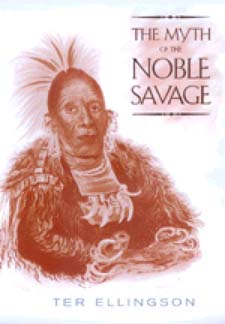 | Title: The myth of the noble savage Author: Ellingson, Terry Jay Published: University of California Press, 2001 Subjects: Anthropology | Cultural Anthropology | Intellectual History | European History | American Studies | European Studies | Postcolonial Studies Publisher's Description: In this important and original study, the myth of the Noble Savage is an altogether different myth from the one defended or debunked by others over the years. That the concept of the Noble Savage was first invented by Rousseau in the mid-eighteenth century in order to glorify the "natural" life is easily refuted. The myth that persists is that there was ever, at any time, widespread belief in the nobility of savages. The fact is, as Ter Ellingson shows, the humanist eighteenth century actually avoided the term because of its association with the feudalist-colonialist mentality that had spawned it 150 years earlier. The Noble Savage reappeared in the mid-nineteenth century, however, when the "myth" was deliberately used to fuel anthropology's oldest and most successful hoax. Ellingson's narrative follows the career of anthropologist John Crawfurd, whose political ambition and racist agenda were well served by his construction of what was manifestly a myth of savage nobility. Generations of anthropologists have accepted the existence of the myth as fact, and Ellingson makes clear the extent to which the misdirection implicit in this circumstance can enter into struggles over human rights and racial equality. His examination of the myth's influence in the late twentieth century, ranging from the World Wide Web to anthropological debates and political confrontations, rounds out this fascinating study. [brief] Similar Items |
| 16. | 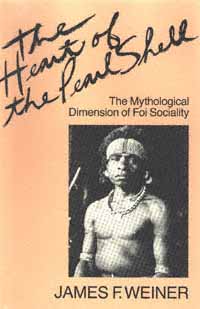 | Title: The heart of the pearl shell: the mythological dimension of Foi sociality Author: Weiner, James F Published: University of California Press, 1988 Subjects: Anthropology Publisher's Description: For the Foi people who live on the edge of the central highlands of Papua New Guinea, the flow of pearl shells is the "heart" of their social life. The pearl shell is the exchange item that mediates the creation of their most important sexual and social roles. The Heart of the Pearl Shell analyzes a number of myths of the Foi people, elegantly bringing together significant ethnographic materials in a way that has important implications for the development of social theory in anthropology and in Melanesian studies. Scholars of semiotic-symbolic anthropology and of comparative religion will also share the author's interest in the meaning and role of mythology in Foi culture.Instead of relying on orthodox methods of Freudian or structuralist interpretation, James Weiner assumes there is a dialectical relationship between the images of Foi myth and the images of the Foi's social world. He demonstrates how each set of these images is dependent upon the other for its creation. This innovative study locates Foi social meaning in the re-creation and attempted solution of the moral dilemmas that are crystallized in mythology and other poetic usages. [brief] Similar Items |
| 17. |  | Title: Public faces, private voices: community and individuality in South India Author: Mines, Mattison 1941- Published: University of California Press, 1994 Subjects: Anthropology | Cultural Anthropology | South Asia Publisher's Description: Individuality is often viewed as an exclusively Western value. In non-Western societies, collective identities seem to eclipse those of individuals. These generalities, however, have overlooked the importance of personal uniqueness, volition, and achievement in these cultures. As an anthropologist in Tamil Nadu, South India, Mattison Mines found private and public expressions of self in all sectors of society. Based on his twenty-five years of field research, Public Faces, Private Voices weaves together personal life stories, historical description, and theoretical analysis to define individuality in South Asia and to distinguish it from its Western counterpart.This engaging and controversial book will be of great interest to scholars and students working in anthropology, psychology, sociology, South Asian history, urban studies, and political science. [brief] Similar Items |
| 18. | 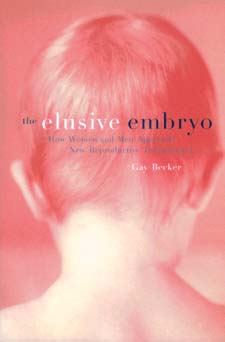 | Title: The elusive embryo: how women and men approach new reproductive technologies Author: Becker, Gaylene Published: University of California Press, 2000 Subjects: Anthropology | Cultural Anthropology | Sociology | Gender Studies | Medical Anthropology | Medicine | Women's Studies | Science Publisher's Description: In the first book to examine the industry of reproductive technology from the perspective of the consumer, Gay Becker scrutinizes the staggering array of medical options available to women and men with fertility problems and assesses the toll - both financial and emotional - that the quest for a biological child often exacts from would-be parents. Becker interviewed hundreds of people over a period of years; their stories are presented here in their own words. Absorbing, informative, and in many cases moving, these stories address deep-seated notions about gender, self-worth, and the cultural ideal of biological parenthood. Becker moves beyond people's personal experiences to examine contemporary meanings of technology and the role of consumption in modern life. What emerges is a clear view of technology as culture, with technology the template on which issues such as gender, nature, and the body are being rewritten and continuously altered. The Elusive Embryo chronicles the history and development of reproductive technology, and shows how global forces in consumer culture have contributed to the industry's growth. Becker examines how increasing use of reproductive technology has changed ideas about "natural" pregnancy and birth. Discussing topics such as in vitro fertilization, how men and women "naturalize" the use of a donor, and what happens when new reproductive technologies don't work, Becker shows how the experience of infertility has become increasingly politicized as potential parents confront the powerful forces that shape this industry. The Elusive Embryo is accessible, well written, and well documented. It will be an invaluable resource for people using or considering new reproductive technologies as well as for social scientists and health professionals. [brief] Similar Items |
| 19. |  | Title: Paths to Asian medical knowledge Author: Leslie, Charles M 1923- Published: University of California Press, 1992 Subjects: Anthropology | Medical Anthropology | Asian Studies Publisher's Description: Like its classic predecessor, Asian Medical Systems , Paths to Asian Medical Knowledge significantly expands the study of Asian medicine. These essays ask how patients and practitioners know what they know - what evidence of disease or health they consider convincing and what cultural traditions and symbols guide their thinking. Whether discussing Japanese anatomy texts, Islamic humoralism, Ayurvedic clinical practice, or a variety of other subjects, the authors offer an exciting range of information and suggest new theoretical avenues for medical anthropology. [brief] Similar Items |
| 20. | 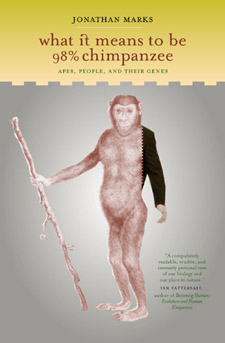 | Title: What it means to be 98% chimpanzee: apes, people, and their genes Author: Marks, Jonathan (Jonathan M.) 1955- Published: University of California Press, 2002 Subjects: EcologyEvolutionEnvironment | Evolution | Physical Anthropology | Sociology | Medicine | Mammalogy Publisher's Description: The overwhelming similarity of human and ape genes is one of the best-known facts of modern genetic sciencenm. But what does this similarity mean? Does it, as many have suggested, have profound implications for understanding human nature? Well-known molecular anthropologist Jonathan Marks uses the human-versus-ape controversy as a jumping-off point for a radical reassessment of a range of provocative issues--from the role of science in society to racism, animal rights, and cloning. Full of interesting facts, fascinating personalities, and vivid examples that capture times and places, this work explains and demystifies human genetic science--showing ultimately how it has always been subject to social and political influences and teaching us how to think critically about its modern findings. Marks presents the field of molecular anthropology--a synthesis of the holistic approach of anthropology with the reductive approach of molecular genetics--as a way of improving our understanding of the science of human evolution. As he explores the intellectual terrain of this field, he lays out its broad areas of interest with issues ranging from the differences between apes and humans to the biological and behavioral variations expressed in humans as a species. Marks confronts head-on the problems of racial classification in science. He describes current theories about race and uses work in primatology, comparative anatomy, and molecular anthropology to debunk them. He also sheds new light on the controversial Great Ape Project, the Human Genome Diversity Project, and much more. This iconoclastic, witty, and extremely readable book illuminates the deep background of human variation and asks us to reconsider the role of science in modern society. [brief] Similar Items |